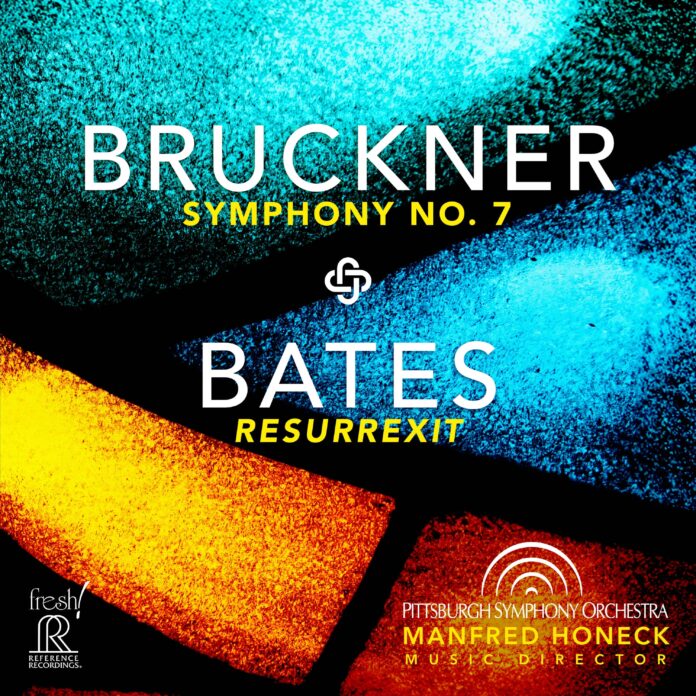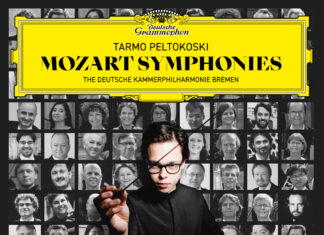Music Review: Bruckner Symphony 7, Bates Resurrexit / Manfred Honeck / Pittsburgh Symphony Orchestra / Reference Recordings
Manfred Honeck’s interpretation of Bruckner’s Symphony No. 7 with the Pittsburgh Symphony Orchestra stands shoulder to shoulder with his acclaimed recording of the 9th. It is a near-perfect performance where everything is nuanced carefully with perfect phrasing. In fact, it is precisely Honeck’s sensitive phrasing that characterizes the whole performance. From the opening tremolo, Honeck sets a tone of hushed intensity. While it may not match the raw tension of Karajan’s Berlin Philharmonic recording (from the complete set of Bruckner symphonies), and while I prefer the opening tremolo a tad louder, Honeck’s approach offers a more ethereal, contemplative alternative that is equally valid and refreshing. What’s more, he produces a rich, full sound from the brass of the Pittsburgh Orchestra (compared to, say, the shrill-sounding Chicago horns of the Solti era). This is the real deal — just listen to the perfect build-up at around 6:45 in the first movement or from 11:25 onwards — this is some impressive brass playing. What is equally striking is Honeck’s attention to detail; as usual, even though this is a live recording, we get to hear every detail, with the wind section, in particular, in perfect form. I would have preferred the strings melodic line to be more prominent in certain parts (check for example at 15:44 – 16:19), but then again, I’m spoiled by the string-heavy Karajan/Vienna recording or Haitink’s 70s with the Concertgebouw, and maybe the first movement coda could be slightly more powerful, but these are personal quibbles. In fact, the build-up to the coda sacrifices power for atmosphere, and this is a very valid approach that characterises Honeck’s overall attention to structure and form.
The second movement is where this recording truly ascends to greatness. Here, the string playing is world-class, from the most delicate pianissimos to the full-bodied greatness. I like how Honeck emphasizes the accents of the first theme, adding a layer of nuance that is often overlooked. And if pacing was the asset in the first movement, here it lets the music unfold skilfully. The Wagner tubas deserve special mention — their performance alone makes this recording a must-have for brass aficionados. It really is that good. The climax, when delivered at full force, is imposing, cymbal clash included. And yes, there are performances where the climax is even more magisterial in force, but perhaps this is not the point here and, after all, it aligns with Honeck’s overarching perspective.
This is the third time I am going to mention pacing in this review, this time in relation to the last two movement. But, see, Bruckner’s 7th stands unique among his symphonies, as its concluding movements often struggle to match the brilliance of their predecessors. It is an interesting point really: this brings to mind a conversation I once had with a cinephile friend about Tarkovsky’s films. We agreed that Tarkovsky’s finales were the pinnacle of his artistry. Similarly, Bruckner and Beethoven are perhaps the only symphonists who consistently deliver powerful finales, sometimes even surpassing the excellence of earlier movements. However, Bruckner’s 7th is the exception to this rule (again, this is a personal opinion. I find the thematic material uninteresting but, from a compositional perspective, there is much to admire; needless to say, Honeck in the liner notes describes the 4th movement as “a true masterpiece of compositional art”). You need a conductor who can make the Scherzo and especially the fourth movement really come to life by contrasting the different themes. So far, Karajan/VPO and Jochum have been the most successful in my book, with Karajan really excelling here. Now, Honeck joins this elite group with what I consider an impressive recorded rendition of the 7th’s final movement.
The album features an additional composition. Resurrexit is a work commissioned by the Pittsburg Symphony Orchestra, and composed by American composer Mason Bates in 2018. It is a melodic piece that incorporates altar bells and the Semantron, a traditional Eastern Orthodox percussion instrument, while drawing inspiration from Easter chants.
Going back to Bruckner, overall, this is a majestic and grand reading that bears all the hallmarks of Honeck’s style. To refresh your memory, his recordings of the 4th and 9th were pretty spectacular (I do have a soft spot for his 4th, maybe the most successful interpretation in recent times if you ask me.) I know the same forces have recorded the 8th, perhaps the pinnacle of the symphonic repertoire, and I am eagerly awaiting it. For the time being, this is a must-listen.
Rating: ★★★★★






